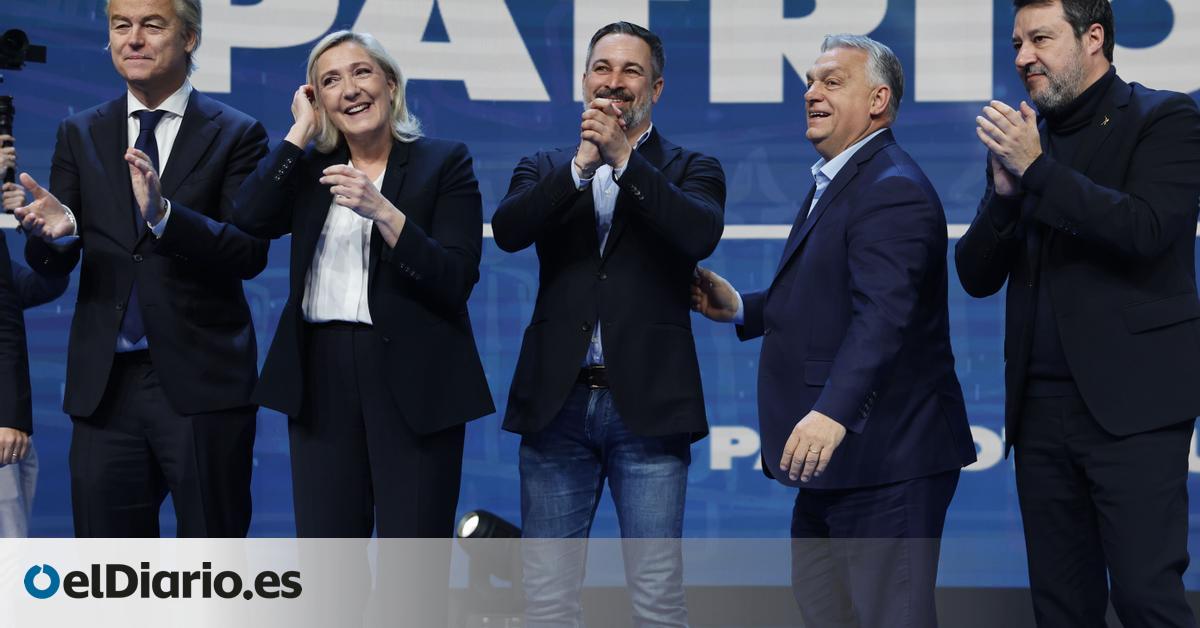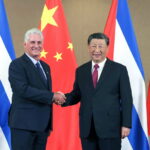
From the Fidity of Hungary to the Portugal Chega passing through Vox, an alternative by Germany or the Fratelli d’Italia de Giorgia Meloni, the ultra -right of all of Europe celebrated as his the victory of Donald Trump while the vast majority of governments digier his return to the White House. The repercussions soon arrived: imperialist desires on Greenland, pressure to increase military spending, order to the allies of NATO and, the final traca, an unprecedented commercial war that puts the world economy in check and, therefore, to the pockets of Europeans and the various national interests. Trump thus put his ultras allies against the strings.
The speech of the leaders of the extreme right has been complicated as Trump raised the pulse against Europe. Although they were emboldened for their return to the White House during the conclave they held in Madrid in mid -February, practically none mentioned the tariffs. Only the host, Santiago Abascal, did to charge against environmental policy. “The great tariff is the green pact and confiscatory taxes,” he said to what was then an imminent commercial war.
Once it was reality, with the imposition of 25% rates to aluminum, steel and cars, and an alleged ‘reciprocal tariff’ of 20%, the president of Vox continued to blame Brussels, socialists already popular with the measures adopted by the White House. “Here the greatest tariff that we are suffering from Spaniards and Europeans is the support of the corrupt caste of Spanish politicians and Brussels politicians,” he said in a press conference: “Neither von der Leyen, nor Sánchez, nor Feijóo have defended the interests of the Spaniards. Our economy competes in conditions of inequality for the ideological bureaucracy of bipartisanism.”
Point to Brussels
Shooting Brussels is the strategy adopted by Trump’s ultras allies. “The European economy and, ultimately, European citizens are paying once again the price of the incompetence of Brussels politicians,” Hungarian Foreign Minister, Péter Szijjáró, criticized on Facebook: “The European Commission should have negotiated!”
Those words came the day after Trump announced a ‘reciprocal tariff’ of 20% to the European Union. Szijjartó defended that Brussels should have offered a reduction in European tariffs to US cars from 10% to 2.5%. “The commission has not negotiated, but has once again converted an economic issue to ideological. And all this while earning thousands of euros per month,” he reproached.
The truth is that by then, although he had not revealed it publicly, the European Commission had already offered the Administration a “zero tariff” to the trade of cars and industrial goods, that is, that it had even gone beyond the proposal of the Hungarian minister. But his interlocutors in Washington had rejected him.
Von der Leyen’s strategy in making that offer sought to delve into the divisions that had already emerged in the Republican party and in the Trump government. These cracks and, above all, the pressure of the markets and managers of US multinationals led Trump to yield and propose a partial truce of 90 days, which had the suspension of the tariffs that had approved the eve to counterattack the aluminum and steel sector.
“This is why we voted against. It was a totally unnecessary and wrong decision,” said Szijjáró after the announcement of Von der Leave of pausing the entry into force of those countermeasures that only had the vote against Hungary and insisted that the EU had not negotiated and had a “calm strategy”, despite the trips of the Commissioner of Commerce, Maros Sefcovic, Maros Sefcovic. to Washington and the hand laid from the EU.
Meloni’s low profile, aligned for now with the EU
The ultra -rightist Giorgia Meloni, who is Trump’s other friend at the European Council’s table, left Orbán only in that rejection, as in all community decisions in which the Italian has managed to read that governing her country with Brussels against is complicated and has found in von der Leay to an ally. The Foreign Minister Antonio Tajani requested with his small mouth a delay in the vote of European tariffs two days before it occurred, but defended the work of the European Commission before the commercial war.
Tajani offered Italy as a mediator with the US. By then a vice president, JD Vance, was already scheduled to Rome and is expected to meet Trump in the White House on April 17. According to Bloomberg, the Italian government was surprised by the enormous magnitude of the tariffs announced by Trump. But Meloni has opted for a low profile and has avoided criticism of Washington. The head of the League, Matteo Salvini, has come to say that tariffs are an “growth opportunity for European companies”, although all sectors have sounded the alarm.
“We are patriots of our nations and he is a US patriot,” said a leader of the extreme right a few weeks ago to explain the actions with which Trump had been threatening. “People are not dumb,” he answered the question of whether they were going to take its toll in Europe a commercial war of their ally in Washington that will inevitably damage the pockets of European citizens.
“A terribly uncomfortable position”
“The good news is that Trump’s commercial war puts the extreme right forces favorable to Trump in Europe in a terribly uncomfortable position. One thing is that the European extreme right supports Trump in principle, or that he supports the tyranny of the administration on peoples that do not care, whether Ukrainians, Canadians, Mexicans or Palestinians. Another very different is to defend Trump and their policies when the victims are countries when the victims are countries. to which these extreme right parties supposedly represent, ”argued in an article published in The Guardian Nathalie Tocci, director of the Institute of International Affairs of Rome.
In general, the forces of the European extreme right have opted to avoid direct confrontation with Trump and have pointed out to the European Union as guilty of all evils even justifying the measures taken by the US president even if they harm European interests.
“Donald Trump has just announced a 25% increase in customs rights over European cars. A brutal decision, but, unfortunate that he has focused his strategy on his judicial conviction, after which he received the support of all the ultras forces, including Trump himself.
“This decision disrupted the global economy. Tariffs and counterparts reduce the prosperity of citizens of all countries,” said Alternative for Germany, who gave Trump the reason in his complaint for tariffs to US vehicles. Precisely match the tariff imposed by the EU was one of the offers made by the Commission of Commerce, which also raised the “zero tariff.” The heirs of Nazism appealed to a “dialogue.”
However, once that scenario has opened, the ultras formations continue to balances, because no one dares to anticipate how the story will end with the most volatile and unpredictable leader sitting in the oval office.
Source: www.eldiario.es

